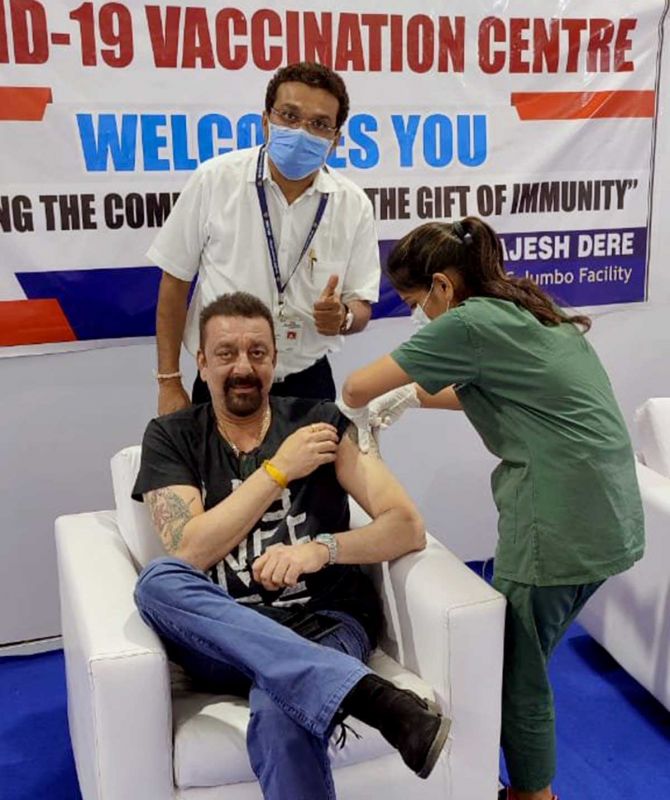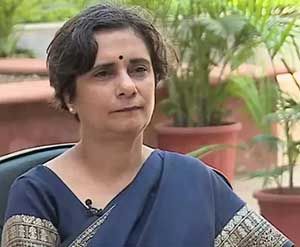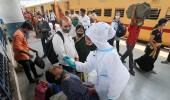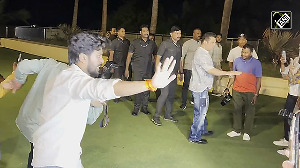'We really need to look seriously to see if there are any local variants.'

Four-and-a-half months of relative peace, from September through January 2021, has been shattered.
SARS-CoV-2 virus, responsible for COVID-19, once again, like a masked, barely identifiable serial hitman on a killer run, is tearing about, running amok amongst us.
Not exactly a killer run, because mortalities are not as high as they were mid-last year, and we have our defences -- double masks and a vaccination drive -- in place.
Thus, we do have places to hide from the virus's lethal gaze.
But why has the surge come now?
Says Wellcome Trust Research Laboratory at Christian Medical College Vellore's Professor Gagandeep Kang about the sudden and sharp COVID-19 case increase, whose sudden impact in Maharashtra is most disconcerting, "Something has to be driving that, right?
"It can't be that everybody in Maharashtra is much worse behaved than everybody anywhere else."
The vaccine scientist and one of the most authoritative voices in our country on vaccine trials and how vaccines work on viruses, speaks to Vaihayasi Pande Daniel/Rediff.com in Part II of her interview, about the existence of mutant strains of the COVID-19 virus in India and answers further vital questions on vaccination.

Till date, as per the information available, it has been said that most COVID-19 vaccines will protect you from the variants discovered too.
You would be able to tell us best: Is there any chance that maybe a year-and-a-half hence, when there are many more types of variants -- some of them more dangerous -- that we would have to go through a giant, new, nation-wide exercise of re-vaccination?
It is certainly possible.
But a lot depends on the duration that the vaccines protect from and the depth of protection that they offer.
There seems to be pretty good protection against the UK variant (of SARS-CoV-2) and somewhat less good protection against the South African variant of the virus.
I think we will need to wait and see. Companies have already started to design new vaccines. And there's no point in being in too much of a hurry.
The vaccines we have will offer some level of protection.
In the meantime, if we need new vaccines, we'll figure it out, because should vaccinated people (in the future) get reinfected with a new variant and once we have that data, then we can decide to make new vaccines.
Last year, we spoke about the rural COVID-19 situation. A doctor said to me, how -- and this is not necessarily restricted to rural people, but to poor people anywhere -- that economically disadvantaged and less literate people may not know how to go about registering online for a COVID-19 vaccine and will be short-changed by the vaccination process.
Do you think poorer people, are in any way suffering from lack of knowledge about COVID-19 vaccination, either in the city or in rural areas?
The importance that is placed on vaccines depends on people's access to the media.
The higher the level of media exposure, the higher the likely knowledge about vaccines and their use.
Where there is less media-led conversations around vaccines, then it's possible that both in terms of awareness and in terms of process, there will be less vaccinated people in those areas.
There is a chance that people, who are less literate, and who are over 60, are not understanding that they should hustle and go out and get that COVID-19 vaccine.
I think everybody should be vaccinated. It is the simplest way of doing the best you can to protect yourself.
It has been explained to me why Europe decided to opt for the AstraZeneca COVID-19 vaccine and America chose Moderna and Pfizer. And how bringing Moderna and Pfizer to India is not a great idea, because of the below-zero-temperatures cold chain involved. But it seems that both Pfizer and Moderna have a higher efficiency as well as efficacy.
Is there any use in the government trying to make either of them available for people who can pay for it? Or it's kind of futile?
Where are the doses available?
Moderna and Pfizer are not supplying the doses that they promised to the US and other places.
When will they have doses available for India?
I heard that Pfizer had applied to provide to India, but I don't know what is the latest status on that application?
Yes. Pfizer withdrew its application.
There isn't any question then, we have to rely on our own resources.
That's right.

So, the most important take away here is that: One should try to delay the second vaccine dose, if one has taken the Covishield vaccine. That is one should do whatever it takes to try to delay the second Covishield vaccine dose to about eight to 12 weeks.
Not whatever it takes.
If you are a person who needs to complete their vaccinations, within a reasonable time. Let's say you need to travel and your visa depends on it, etc, then go ahead and take it.
All you're doing with taking the second dose later is potentially improving protection and the robustness of your immune response.
At an individual level, a lot is determined by a person's circumstances.
At a population level, the longer the gap, the better the overall likely efficacy of the vaccine.
Remember that they are basing all of this on data from about 20,000 people. That's what we do in clinical trials.
The actual impact of all of these approaches, will be measured once the vaccines are being used in real life.
And in the UK, they already gathering the data from people who are being vaccinated in the UK with the longer interval.
So, we will have much clearer answers about the level of protection, again, in a real life scenario, where not everybody is healthy and there are lots of elderly people, who have comorbidities, etc, etc. Right?
And that will give us a sense of what the impact of the vaccine is likely to be.

We will have that data maybe in about six months?
Probably less.
The UK is vaccinating their population at very high levels. The data gathering has already started with the 12 week-gap for the AstraZeneca vaccine, people will be receiving their second doses now.
Very likely that we will start to have data maybe end April, or some time in May.
You stated that protection for Covaxin, produced by Bharat Biotech and ICMR begins about two weeks after the second vaccine dose at 28 days?
Is that vaccine a better choice for the most vulnerable, because one gets the protection quicker?
And for Covishield (the AstraZeneca vaccine manufactured by Serum Institute of India), after waiting for the second jab for up to 12 weeks, when does protection truly sort of kick in?
The AstraZeneca vaccine (Covishield) gives 70 per cent protection, three weeks after first dose.
 IMAGE: Dr Gagandeep Kang
IMAGE: Dr Gagandeep KangThe variant issue is a little confusing -- the mutant strains of the COVID-19 virus. I believe that that sequencing for various possible types of variants has been submitted to the National Institute of Virology, Pune.
Many experts say that probably some amount of the London variant would be roaming locally, maybe in states like Maharashtra, where there are a lot of communication links. There is talk about local variants.
You had mentioned that it's more likely to be a local variant playing a role in the present peaking/surging of COVID-19 cases?
That is based on the fact, that we were assured by the government that we don't have any of the foreign variants, or we have a total of 400 of the foreign variants in the strains that they have seen.
The government has to, sort of, expand on that and give us more information?
Well, obviously, the government has to expand on that and give us more information.
But taking government data at face value, 400 variants out of all that we have sequenced, indicates that those variants may not be driving the surge at this time.
Given the way things are going and the fact that in most places, where you have seen these huge, rapid increases in COVID-19 caseloads, in very localised settings, like we are seeing largely from Maharashtra -- but I'm sure from Maharashtra now it has (spread) to other parts of the country.
Something has to be driving that, right?
It can't be that everybody in Maharashtra is much worse behaved than everybody anywhere else.
I think we really need to look seriously to see if there are any local variants.
Feature Presentation: Ashish Narsale/Rediff.com












 © 2025
© 2025